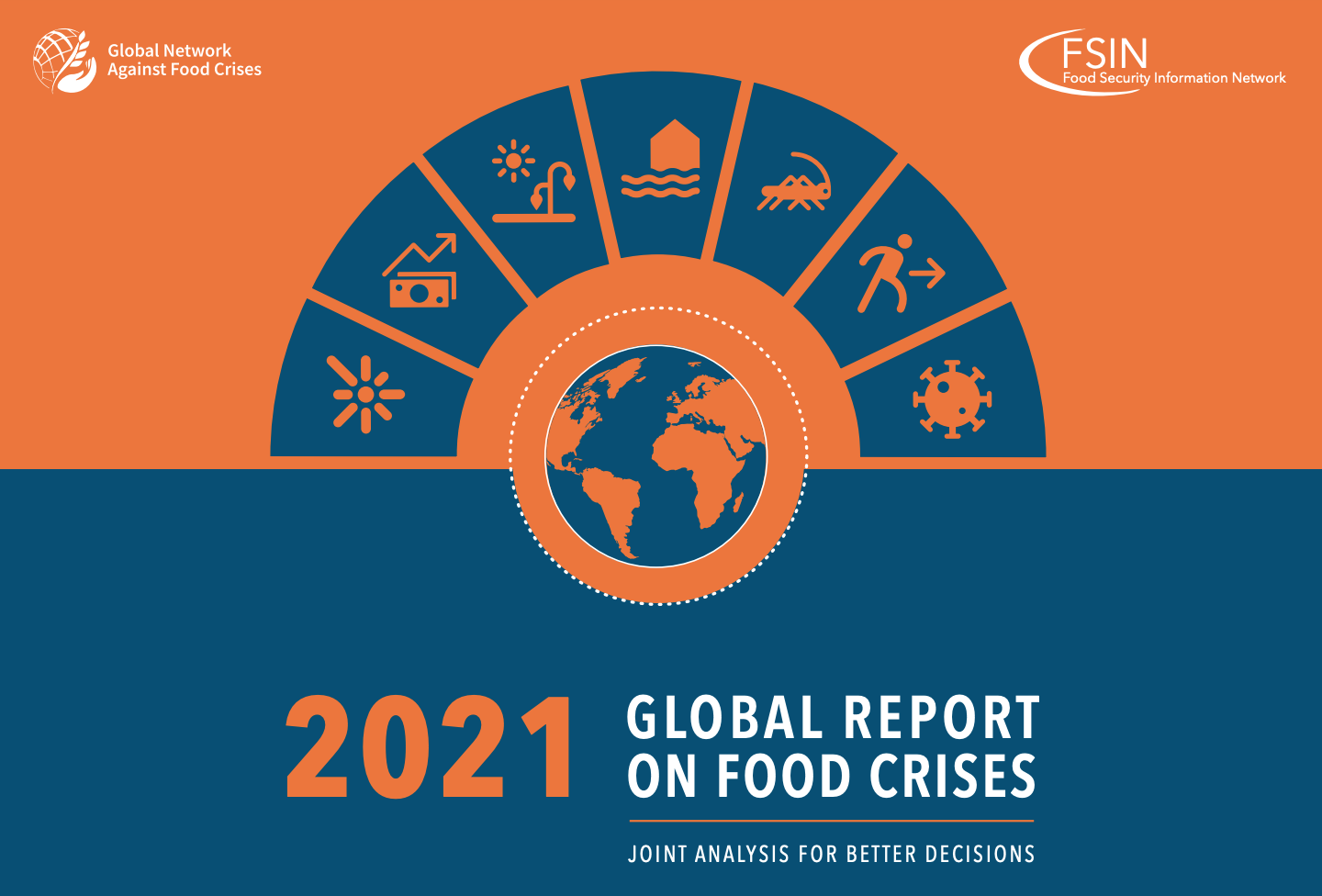More than 155 million people experienced acute food insecurity at crisis level or worse around the world in 2020, an increase of 20 million from 2019 and a five-year high, as the COVID-19 pandemic compounded economic shocks, conflicts, and climate and severe weather impacts, estimates the 2021 Global Report on Food Crises (GRFC).
In a mutual call for enhanced resilience, IFPRI, the Food Security Information Network (FSIN), FAO North America, the World Food Programme (WFP) USA and the IFPRI-led Food Security Portal co-organized a policy seminar on June 17 to discuss the report’s implications. Moderated by Rob Vos, Director of IFPRI’s Markets, Trade and Institutions Division, the session focused on the experiences and strategies to help build food system resilience and prevent conflict at the same time.
“The food crises leading to this food insecurity are protracted and cannot be solved by humanitarian aid alone,” said IFPRI Director General Johan Swinnen, calling for more structural solutions at the nexus of humanitarian assistance, development, and peace building.
The findings of the GRFC, the flagship publication of the Global Network Against Food Crises, shows the persistence of hunger in most fragile contexts and among vulnerable social groups since its first publication in 2017. But the capacity exists to reduce global hunger, said Giampiero Muci, Senior Policy Officer and Director General for International Partnerships for European Commission. ”We have a common understanding of the root causes and we need to reverse these long-term trends to prevent worse crises in the future,” he said, underlining the need for ambitious outcomes from the upcoming UN Food Systems Summit while keeping the commitment to fight food crises high to achieve zero hunger (SGD2).
“Although we have a situation at hand that got worse, we have more information from the GRFC to work with,” said Dominica Sabella, FSIN Communications Officer, WFP. Given the continuing pandemic, the outlook for 2021 is already very alarming, added Lavinia Antonaci, Technical Coordinator with the Global Network Against Food Crises. The threat of famine persists (IPC Phase 5) in Madagascar and Ethiopia, she said, which could lead to even graver food crises.
All panelists underscored the enormous long-term economic benefits from building resilience. For every dollar invested in adaptation and resilience, we save $3 in humanitarian assistance, noted Jim Barnhart, Assistant to the Administrator at the USAID Bureau of Resilience and Food Security. According to recent GRFC analyses, humanitarian assistance to food crises rose by almost 25% between 2016 and 2019, highlighting the urgent need for investments in resilience.
Cash transfers work well in conflict settings as a means of assistance. During the Yemen civil war, cash-based transfers increased child dietary diversity and reduced stunting among the poorest households, “allowing a generation born during conflict to actually prosper in their adult lives,” said Clemens Breisinger, IFPRI Senior Research Fellow and Middle East & North Africa Team Leader. Such programs face logistical challenges in carrying out the transfers (via mobile phones, internet, etc.) and ensuring that the aid is going to the correct people. Still, “cash-based transfers are not a substitute for infrastructure investment,” he added.
Panelists underlined the importance of national and regional responsibility for addressing the sources of food insecurity and that there is no “one size fits all” solution. International efforts depend on engaging with government and national stakeholders and ensuring that the international community contributes to and aligns with the long-term visions of individual countries, said Dominique Burgeon, Director at FAO in Geneva.
“Conflict is both a major cause of, as well as a result of, food insecurity,” said USAID Conflict and Violence Prevention Integrator David Alpher, noting that rapid shifts in food availability and prices can trigger unrest and how conflict disrupts food distribution networks and livelihoods. Further, Tanya Boudreau, Deputy Chief at Famine Early Warning Systems Network (FFEWSNET) said, “it takes a long time to build resilience and next to no time for conflict to wipe out these gains,” referencing the conflict and decimated livelihoods in Tigray, Ethiopia. As conflict is about people and politics, both panelists stressed the need to recognize resilience as a social issue, in order to ease the transition from humanitarian relief to longer-term development.
Pandemic-related food price increases continue to put pressure on livelihoods, according to WFP Chief Economist Arif Husain. “As the prices go up and more people get pushed in poverty, the future points to a grim situation where resources available to meet high demands will be much lower,” he said. Martien van Nieuwkoop, Global Director of Agriculture and Food Practice at the World Bank, outlined four entry points for food security to aid poverty reduction: Strengthened governance and institutional capacity, job creation, resilient and sustainable resource management, and prevention of food crises.
In her closing remarks, Jocelyn Brown Hall, Director of the FAO Liaison Office for North America, reaffirmed the importance of building resilience to prevent food crises and conflict. “Humanitarian assistance, while critical and will remain critical, is more expensive and if we spotlight more agrifood systems and the resilience programs to prevent food insecurity, our finite development dollars will go further,” she said.
Customizing and calibrating resilience programming to local contexts is key to such efforts, she said; only with locally-focused solutions can food crises and conflict be prevented and food security achieved.
Swati Malhotra is a Communications Specialist with IFPRI’s Markets, Trade and Institutions Division; Alexandria Richter is a Partnerships Intern with FAO North America.







